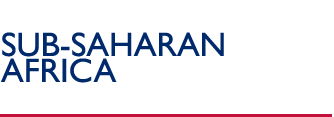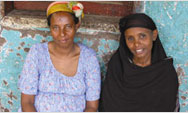Features
USAID/Malawi launches Interactive Radio Instruction

Malawi’s education system struggles with large class sizes, limited supplies, and insufficiently
trained teachers. The USAID-supported Tikwere interactive radio instruction project is part of an
effort to improve the teaching and learning conditions for over 3 million pupils in the primary
schools. [more].
Africa Education Initiative: Ambassador's Girls' Scholarship Program Replaces Child Labor with Homework in Liberia

Beatrice Roberts has an intense gaze for a 6th grader and stands erect at the podium of a small church next to her school in the Soul Clinic community of Paynesville, a rural suburb of Liberia's capital, Monrovia. She speaks words of thanks for the Ambassador's Girls' Scholarship Program, part of President Bush's $600 million, nine-year Africa Education Initiative (AEI) run by USAID. [more].
New Focus on African Education

In September 2007, First Lady Laura Bush announced the creation of a new presidential initiative to support basic education in Ethiopia, Ghana, Honduras, Liberia, Mali, and Yemen beginning in fiscal year 2008. Through this initiative, USAID will provide an additional 4 million students with access to a quality basic education by the end of five years. Follow these links for more information on the overall initiative as well as plans for its implementation in Ethiopia, Ghana, Honduras, Liberia, Mali, and Yemen.
Reliable Energy Enables Effective Response to HIV/AIDS in Rwanda

Dependable access to efficient and affordable energy is essential to providing quality health care. Without electricity health service provision is limited - facilities can only provide care and treatment during the day and providers cannot utilize the equipment essential for basic care. Since the majority of Rwandans do not have access to health facilities with reliable electricity, this undermines the country's fight against HIV/AIDS and other critical threats to health. [more]
Launching of the West Africa Cotton Improvement Program

USAID/WA officially launched the main component of the West Africa Cotton Improvement Program (WACIP), a $27 million initiative to improve the cotton sector in West Africa. The International Soil Fertility and Soil Management Center (IFDC) will implement the main component in the four major cotton producing countries Benin, Burkina Faso, Chad and Mali. The WACIP Chief of Party and the USAID/WA Agriculture and Environment Team Leader just completed a visit to senior staff of US Embassies, Ministries of Agriculture and Commerce, and other stakeholders of the countries in February to introduce and launch the program. Overall, the WACIP received a warm welcome from the recipient countries. WACIP aims to raise the net farm income of the cotton farmers in the major cotton-producing countries by targeting nine critical intervention areas in the cotton value chain, ranging from institutional reforms and greater productivity to improved grading and processing capacity in the region. The program will work in concert with cotton improvement programs of other donor agencies. [more]
Liberia Powers Up

When Liberian President Ellen Johnson Sirleaf took office a little over a year ago, electricity services in her country were virtually non-existent. After 14 years of civil war, the entire power grid was broken. Except for diesel generators owned by a handful of individuals, all power supplies were gone. The state power company, Liberia Electricity Corporation (LEC), was moribund - no infrastructure, no fuel source, no customers.
The president promised that she would launch an emergency power program in Monrovia, the capital city, to begin re-establishing electricity. "Small light today, big light tomorrow" became the government's slogan. [more]
Africa Education Initiative

April 24th, 2007 - Africa Education Initiative (AEI) Videos released. Primary school enrollments in African countries are among the lowest in the world. Education in most of Africa is adversely affected by limited funds and lack of adequate numbers of teachers, classrooms, and learning materials. President Bush's Africa Education Initiative (AEI) is a $600 million multi-year initiative that focuses on increasing access to quality basic education in Africa through scholarships, textbooks, and teacher training programs. [more on AEI]
USAID's Office of HIV/AIDS (OHA) staffers Margaret McCluskey and David Stanton were on-site at the clinic, which is supported in part through USAID's partnership with the International HIV/AIDS Vaccine Initiative (IAVI).
More Information; The Presidents Emergency Plan For AIDS Relief, USAID Office of Global Health.
Fighting HIV/AIDS in Africa

In sub-Saharan Africa, where the world's AIDS epidemic has hit the hardest, 3.2 people became newly infected in 2005 and 2.4 million adults and children died of AIDS related illnesses. The region has just over 10 percent of the world's population, but more than 60 percent of all individuals infected with HIV/AIDS live in sub-Saharan Africa. There are now 24-28 million living with the virus in the region. The number of AIDS orphans is expected to rise from the current estimate of 11 million to 20 million by 2010. Fighting HIV/AIDS is major priority for USAID's programs in Africa.
Through the President's Emergency Plan for AIDS Relief, run by USAID and other U.S. Government agencies, HIV/AIDS prevention, care, and treatment programs are expanding rapidly. The Emergency Plan supports anti-retroviral therapy for people living with HIV/AIDS, expanded access to counseling and testing, prevention of mother-to-child transmission, community-based services for orphans and vulnerable children, and a comprehensive "ABC" approach-abstinence, being faithful, and correct and consistent condom use. [more]
Additional Resouces on USAID's Efforts to Fight HIV/AIDS in Africa
Back to Top ^
|


